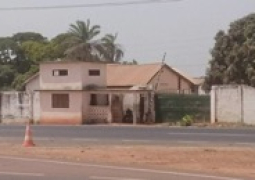She was accompanied by Dr. Julian Wright, the senior West Africa Climate Change and Natural Resources adviser.
Engaging journalists at the British High Commissioner’s residence in Cape Point, Janet Rogan disclosed: “I am very happy to be back in The Gambia for a couple of days visit following up on COP26, the Conference of Parties on Climate Change, that took place in Glasgow last year in November. Of course I was happy to visit The Gambia before COP26 too.
“So I am here to see some of the progress that has happened since then. This morning for example, I was very delighted with the Hon. Minister for Environment for launching The Gambia Environmental Alliance, which is an alliance of civil society and private sector here in The Gambia, who are really dedicated to making climate action part of the way they operate here, really dedicated, really connected to this agenda, which is fantastic because climate action is not something only for governments. It has to be for all of us because all of us are reflected with what is going on with the climate.”
“Government has to take the lead. It has to do the legislation and the regulation, and then it is the private sector that has to respond, because for example, any of the emissions that we want to measure when it comes to climate change comes from agriculture and industry, which is private sector activity. Beyond that, we need everybody to be part of this campaign, because every community, every village, every school, every family is affected by the change that is already going on in our climate. So climate action is for all of us.”
“Tomorrow I am going to see the impact of the mangroves regeneration here in Banjul and along the coastline. Why? Because mangroves are there to stop the coastal erosion. They are also part of maintaining the biodiversity in those locations, and they can also be a carbon sink of the green parts of this country. At the same time, they are also source of livelihoods, and I am going to see the TRY oyster women’s cooperative, who have been looking at really how to diversify and protect their income that they do on the river on the oysters and also from other products around there.”
“After that I am going to see Mbolo, a renewable energy center, where training is being done to women and girls to help them to assemble solar installation and do training on them once they have been installed; and finally, I am going to visit the forest. I don’t think it will be possible to come to The Gambia without visiting the forest and breathing in some of nature to see how the nature-based solutions and eco-tourism can be part of the economic green growth that will take The Gambia into a recovery green after COVID and after some of the development setbacks that we have seen globally with the global economic recession.”



